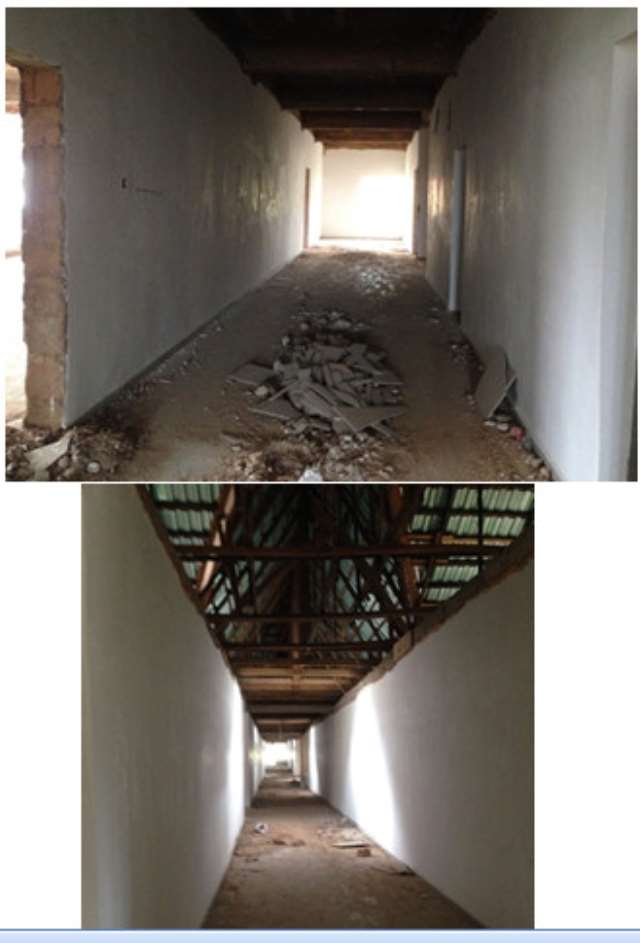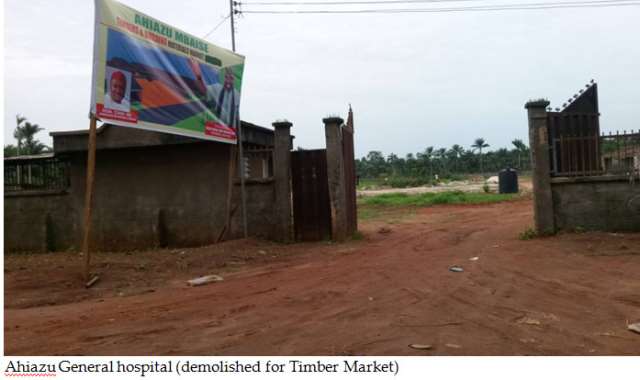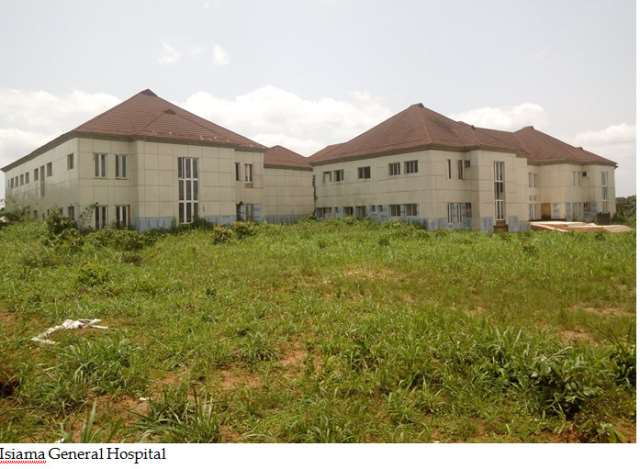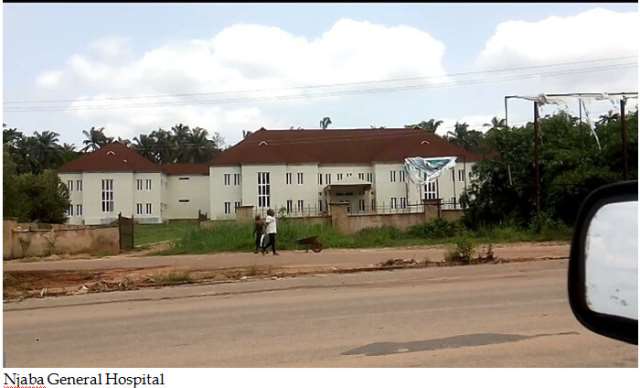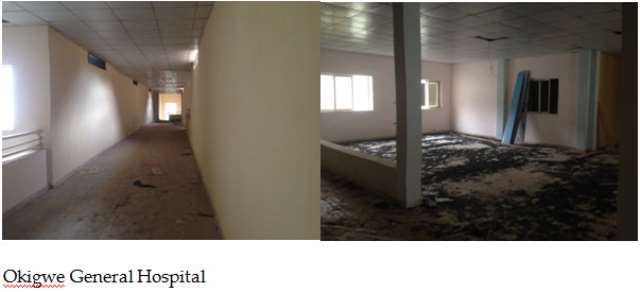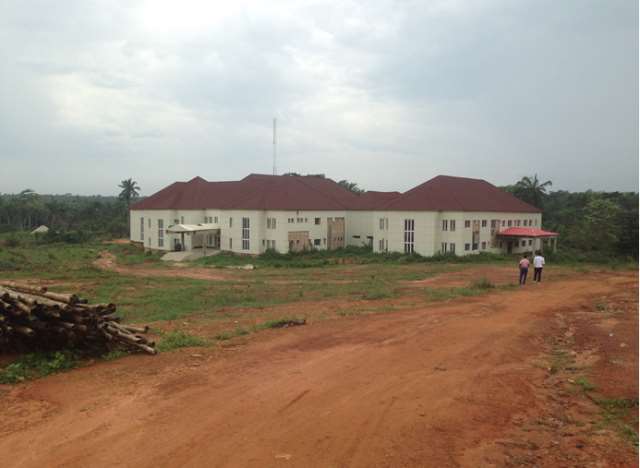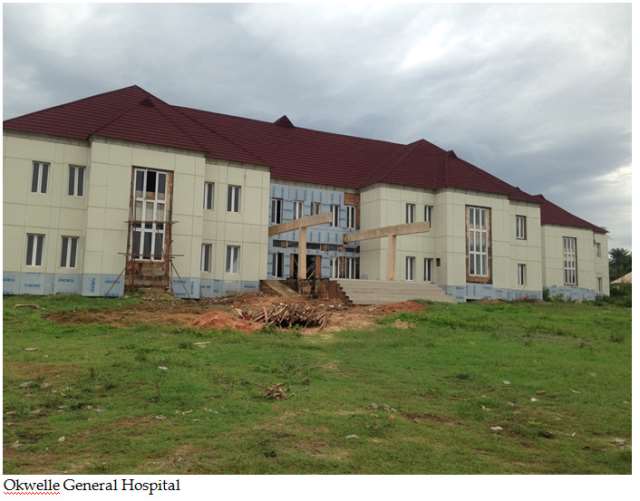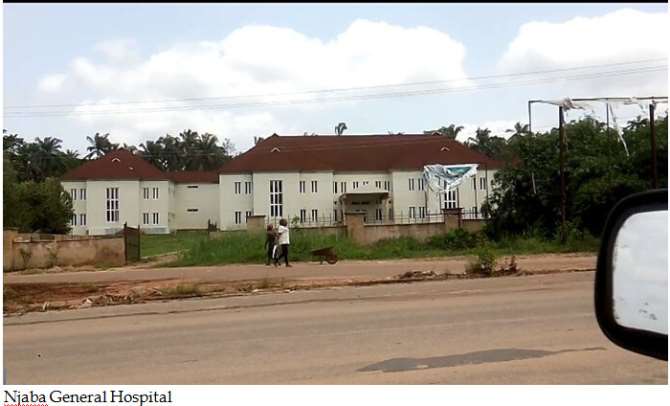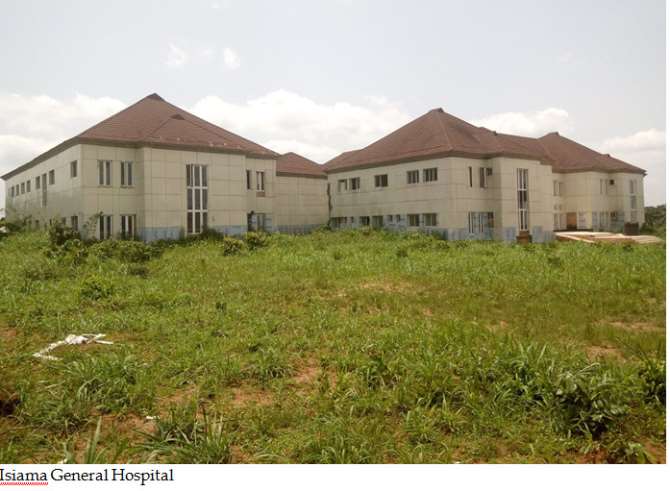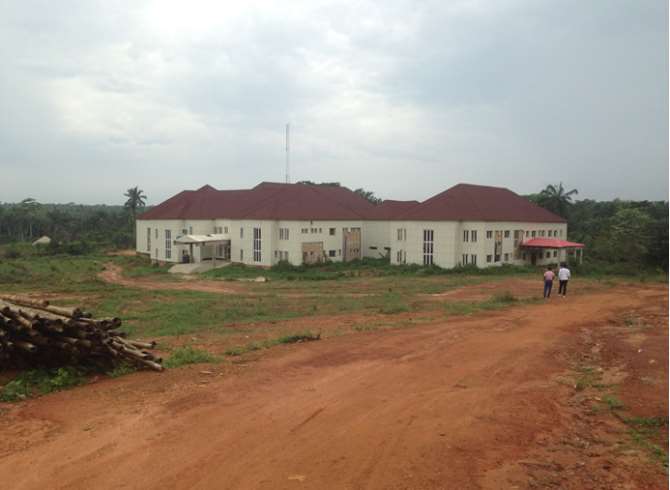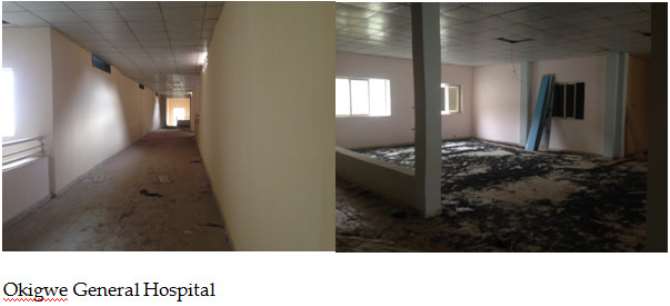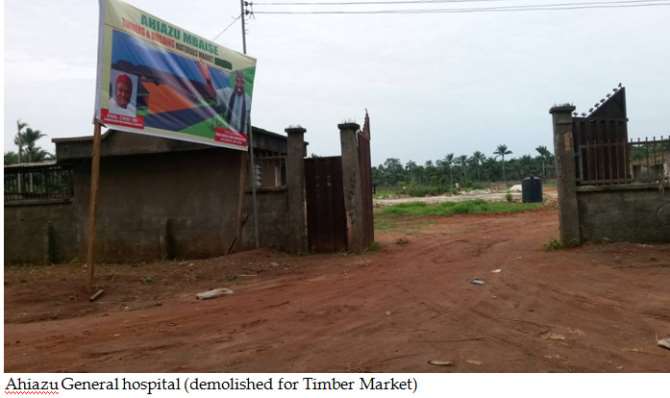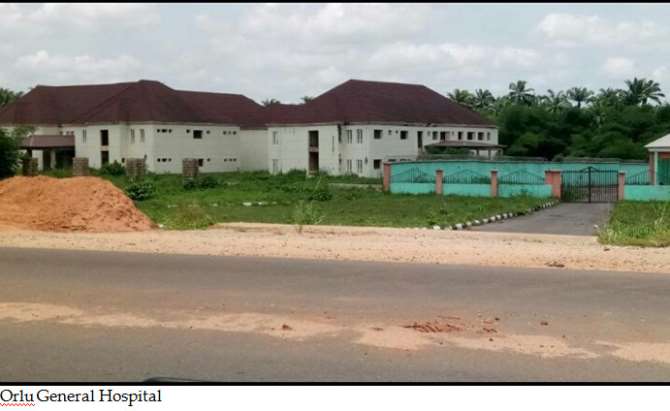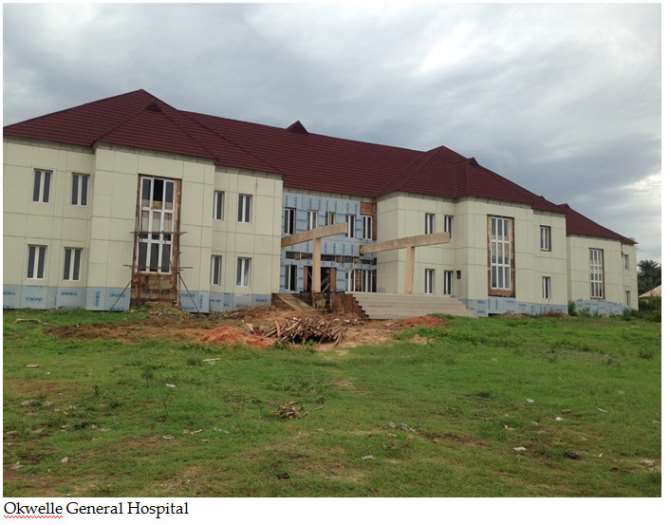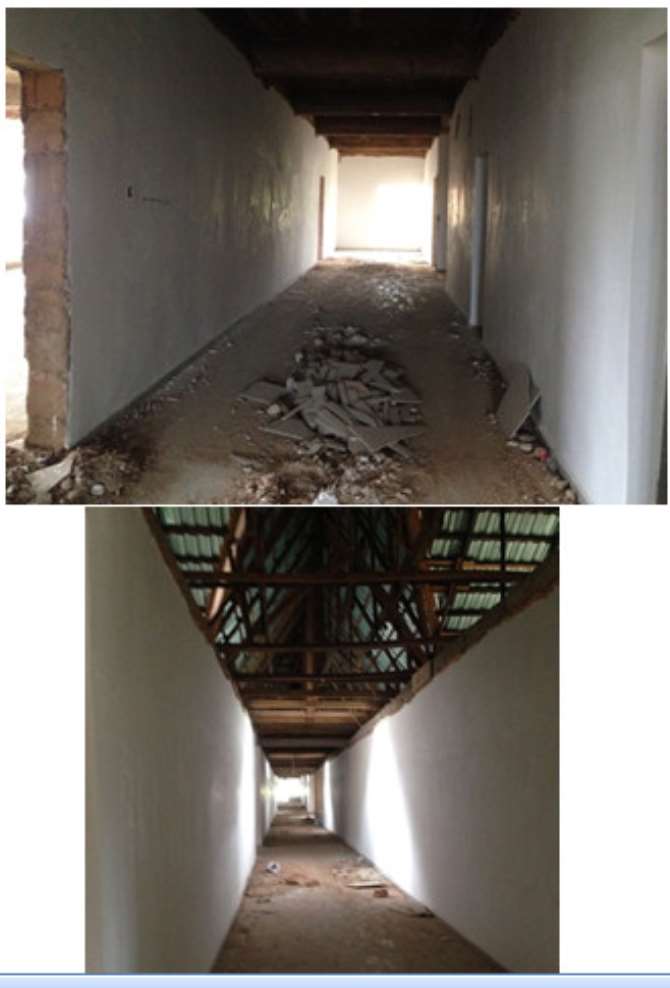Okorocha’s Fraudulent Hospitals

Healthcare is paramount to improving productivity of the workforce. The more healthy people are, the more they are enabled to participate in economic activities. It is believed, thus, that RochasOkorocha would prioritize health policy reform within his economic agenda.6 years after being Governor of Imo state, what is Imo state’s healthcare coverage policy? As someone with a penchant for naming all state programs and reforms after himself, one is compelled to hear now of a robust healthcare system in Imo state: ImoCare? RocheCare? NneomaCare? Or FreedaCare?
Imo state’s healthcare system is not different from other parts of Nigeria. Many issues over the years explain the lack of quality and efficiency of the health sector in Nigeria. Most are plagued by inadequate funding/financing models, weak governance and enforcement, poor service quality and inadequate infrastructure.
In other cases, household poverty and insufficient risk pooling contribute to this pool of healthcare system inefficiencies. Others include a highly inefficient and declining workforce owing to brain drain and disparate wages among the workforce or even poor quality of health staff.
In public or general hospitals, long queues, preferential treatments and high-handedness of the few qualified medical personnel are daily experiences of Nigerians. To compound these, it has taken years to pass a national health policy that has not found proper implementation.
Given these factors, Okorocha’s campaign promises for robust health programs in Imo state were a welcome development. “Free Health For all” “New Hospitals” projects were declared to fanfare and pomp.
Promised basic health services include the treatment of aged citizens at no cost, and the improvement of medicated services in the state. In most states, these promises does not address the underlying problems of healthcare system in Nigeria, stated above.
In Imo state, Okorocha promised the upgrading of facilities and the considerable improvement in basic medical services rendered by the general hospitals. Imo state, however, like so most states in Nigeria, has no specific health policy, besides the generic offers noticeable among all APC states.
In all Local governments surveyed, the feedback from respondents posed the same verdict: that healthcare services in the General Hospitals have declined, with lack of sophistication of equipment, and expensive out-patient services for citizens. Respondents also declared that “no noticeable improvement in the employment of quality workforce or rapid standardization of general hospitals” Some of these were confirmed on visits to the Local governments.
Many pregnant and feeding mothers complained bitterly of the quality of service and also of expenses incurred during pre-natal check-up and diagnosis. In many cases, these necessitated the decision to patronize private sector hospitals, leading to an increase in out-of-pocket expenditure. This is worse when the lack of consistency in salaries of public servants (who make up the bulge of employment) in Imo state is added to the mix.
RochasOkorocha, like many other governors in Nigeria, has no specific policy objective for initiating “health programs” in Imo State. Many General Hospitals visited are in dire shape years after Rochas’ election. Most users complain of little or no difference between services offered and no difference in pricing for health services.
For the gullible public, this strategy of “movement without motion” never fails. Roads that lead nowehere, white elephant and phantom programs that serve no specific economic purpose. It worked, and still works, in Imo state.
Okorocha’s crave for political visibility is not lost on the astute. His construction ventures in Imo must be portrayed as “doing something”; construct buildings around the state, even if they cannot be completed or if they are not viable. In 2014, Okorocha’s establishment of new hospitals are not informed by any data but the brash urge to throw money at problems.
Njaba General Hospital
Without any information on revenue, or how new hospital projects will be funded, Okorocha announced the construction of new hospitals across all the local governments; whereas existing general hospitals have no access to basic clean water, consistent energy, and an acute shortage of medical personnel.
RochasOkorocha started the construction of these new “world class” hospitals in 2014. Many respondents saw it as a calculated move towards the 2015 election towards winning electoral votes within the state. These hospitals were promised to begin functional services by 2015 January and were constructed across the 27 local governments in the state. Till date, none of the visited hospitals have been completed since 2014 when their constructions started.
The decisions underlying these new hospitals are impractical, wasteful, and are not based on sound policy qualities (e.g. technical efficiency, equitable distribution of health welfare or allocative efficiency). With high poverty, inconsistent wages, and an over-burdened public health system, many Imo citizen are paying for their healthcare in private hospitals at a high cost.
Isiama General Hospital
This is the summarized feedback from our visit around the state (all of them are not completed, unequipped, and abandoned):
- General Hospital AbohMbaise (Serving 3 LGAs)
- Njaba LGA (No Equipment, No Gate, Not Opened, Rusty, Bushes all over)
- Orlu LGA (No Equipment, No Gate, Not Opened, Rusty, Bushes all over)
- Nkewrre LGA (No Equipment, No Gate, Not Opened, Rusty, Bushes all over)
- A “joint” Hospital in Nwagele LGA being run by the Catholic Church, serving about 3 LGAs
- A “joint” Hospital in IsialaMbano LGA being run by the Catholic Church, serving about 2 LGAs
- Ahiazu LGA (No Equipment, No Gate, Not Opened, Rusty, Bushes all over)
- Ikeduru LGA (No Equipment, Bushes all over and locked up)
- Mbaitoli LGA has NO General Hospital
- In Ahiazu LGA, The main General Hospital was demolished for a “Timber Market” while the new hospital remainsabandoned with rusty walls and bushy environment.
Like other states, the main financial model for healthcare coverage in Imo state is on out-of-pocket fees. The loss in social welfare owing to the construction of these new but incomplete and unequipped facilities have huge implications. If completed, perhaps a community-based healthcare insurance partly funded by the state and supplemented by citizens would have been a beautiful model worthy of emulation. This will increase access, affordability (equity) and improve quality (efficiency)
Naturally, Okorocha, like many other state governors, are in that crucial position to lead sustainable development projects that enrich future generation and not rob them. In fact, the solid performance of many state governors would naturally reinforce the need to implement decentralization as promised in the constitution. Not so!
As someone who does not believe in social or political accountability, Okorocha’s health policy in Imo state has been, at best, vague. Given limited resources, what is the policy criteria (efficiency or equity) for setting up 27 new general hospitals? Who is designing them? Who is building them? Who is funding them? Who will operate them? Would upgrading the available ones be a more reasonable option? Is there enough data available to justify the construction of new hospitals? Are the services going to be subsidized? How will it be sustained? What is the financing model?
Okorocha’s policies does not state how efficient or sustainable the citing of 27 new general hospitals are. What are these hospitals intended for: primary healthcare or specialist centres? Who is the primary care provider: Government or Private sector? How will they be sustained? Even when completed, what is the model of running these 27 new hospitals? Are they built for private-sector operations while the state at as regulator?
Like most of his policy programs, the underlying guidelines for Okorocha’s policy programs are not to correct inefficiencies, redistribute wealth, provide jobs for the people, or advance welfare, or equitable benefit distribution. In a nation where medical tourism account for about USD $1billion, Okorocha’s hospitals and health reforms, and healthcare policy would have been a shining example of how to design and implement healthcare reform in Nigeria.
By indulging in repeated half-baked and poor quality construction around the state, Okorocha’s administration is robbing the state in terms of quality of work, resources and effort. This is because most of these buildings have been constructed without transparency, nor were the projects carried out by due bidding or due process. Worse still, with limited state resources, these projects are not completed.
Mr Okorocha has wasted state taxpayers fund having spent hundreds of millions constructing his “giant” but empty health centres across the state with none duly completed (except the Airforce centre along Owerri North). In short, Mr Okorocha’s health policies have been half hearted, and mostly have been detrimental to hundreds of thousands of Imo citizens.
A perfectly designed healthcare system with a carefully crafted (equitable or efficient) policy would have shown and signalled the seriousness of one Nigerian governor with the heart and will to implement healthcare reform in Nigeria. At best, it would have projected Okorocha as a forthright forward thinking beacon of hope in Nigeria, especially given his ridiculous presidential ambition. An incapacitated but honest president is much better than a brazenly corrupt and incompetent Okorocha.
BamikoleAdeleye is currently in Imo State on his Eastern Nigeria Governance Tour.
